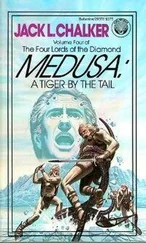Jack Chalker - Cerberus - A Wolf in the Fold
Здесь есть возможность читать онлайн «Jack Chalker - Cerberus - A Wolf in the Fold» весь текст электронной книги совершенно бесплатно (целиком полную версию без сокращений). В некоторых случаях можно слушать аудио, скачать через торрент в формате fb2 и присутствует краткое содержание. Год выпуска: 1982, ISBN: 1982, Издательство: Del Rey / Ballantine, Жанр: Фантастика и фэнтези, на английском языке. Описание произведения, (предисловие) а так же отзывы посетителей доступны на портале библиотеки ЛибКат.
- Название:Cerberus: A Wolf in the Fold
- Автор:
- Издательство:Del Rey / Ballantine
- Жанр:
- Год:1982
- ISBN:0-345-29371-1
- Рейтинг книги:4 / 5. Голосов: 1
-
Избранное:Добавить в избранное
- Отзывы:
-
Ваша оценка:
- 80
- 1
- 2
- 3
- 4
- 5
Cerberus: A Wolf in the Fold: краткое содержание, описание и аннотация
Предлагаем к чтению аннотацию, описание, краткое содержание или предисловие (зависит от того, что написал сам автор книги «Cerberus: A Wolf in the Fold»). Если вы не нашли необходимую информацию о книге — напишите в комментариях, мы постараемся отыскать её.
Cerberus: A Wolf in the Fold — читать онлайн бесплатно полную книгу (весь текст) целиком
Ниже представлен текст книги, разбитый по страницам. Система сохранения места последней прочитанной страницы, позволяет с удобством читать онлайн бесплатно книгу «Cerberus: A Wolf in the Fold», без необходимости каждый раз заново искать на чём Вы остановились. Поставьте закладку, и сможете в любой момент перейти на страницу, на которой закончили чтение.
Интервал:
Закладка:
Cerberus: A Wolf in the Fold
by Jack L. Chalker
For Richard Witter, another unsung living legend to whom the SF community owes a great deal
PROLOGUE
Beginning Again
There was not supposed to be fear in the structured and ordered society of the civilized worlds; there was some sort of law against it. Clearly, there was nothing to fear any more. And in a society like that, somebody who knew the true folly of complacency could get away with almost anything.
Tonowah Resort was the standard for a standardized society. Golden beaches washed by warm, sparkling water and, set back from the ocean, a line of high-rise luxury hotels surrounded by exotic tropical plants and containing any sort of diversion that anybody might desire—from the traditional swimming, fishing, gambling, dancing, and whatever to the most exotic pleasure machines of a mechanized society. Leisure was big business in the Confederacy, where the basic manual-labor jobs were all totally computerized and human beings held jobs only because their leaders limited their absolute technology so people would have something to do.
Genetic and social engineering, of course, had reached the state of the art. People did not look alike. Experiments had demonstrated that such a direction tended to kill self-esteem in identical-looking people and cause them to strive, somehow, for the most bizarre ways to prove their uniqueness. Nonetheless, variety was kept within bounds. Still, people were all physically beautiful, the men uniformly trim, lean, muscular, and handsome, the women exquisitely formed and stunning. Both sexes were generally of uniform height, about 180 centimeters give or take a few, and had a uniform bronzed skin tone. Previous racial and ethnic features merged into an average without extremes. Their family was the State, the all-powerful Confederacy that controlled some seven thousand six hundred and forty-two worlds over a third of the Milky Way Galaxy; the worlds themselves had been terraformed to conform as much as possible one to another. Medical science had progressed to the point that much of what ailed people could be easily repaired, replaced, or cured. An individual could remain young and beautiful until he died, quickly, quietly, at an age approaching a hundred.
Children were unknown on the civilized worlds. Engineers did all the work and maintained the population stability at all times. Children were born in Confederacy labs and raised in Confederacy group families in which they were carefully monitored, carefully raised and controlled, so that they thought as the Confederacy wished them to think and behaved, as the Confederacy wished them to behave. Needed proclivities could be genetically programmed, and the child then raised with all he or she needed to become the scientist, the engineer, the artist, the entertainer, or, perhaps, the soldier the Confederacy required. All were not equal, of course, but living in the civilized worlds required only average intelligence, and only the specialized jobs required geniuses. Besides, overly bright people might become bored or question the values and way of life of the civilized worlds.
There were of course aberrations, but these were few and far between; in fact, the society of the civilized worlds was the most egalitarian society ever known to Man. Places were found outside the structure for obvious aberrations. For those few who weren’t detected until too late, a small, specialized group known as Assassins ferreted out the rotten apples and eliminated the threat.
There were worlds beyond the civilized worlds—the frontier, where nothing had yet been standardized. The best Confederacy analyses had predicted early on that a society such as the civilized worlds bred stagnancy and loss of creativity and drive, thus ending innovation and racial growth and eventually leading to the destruction of the human race from internal rot. To prevent all that, a small percentage of humanity was permitted to keep pushing outward, discovering and conquering new worlds and living in a more primitive style. Still subject to random gene mixing in the old tried and true ways, people out on the frontier were still very different-looking. Tight control was not exercised, for the Confederacy was not looking to make things easy out there. Hardship, deprivation, fierce competition, and aggression—all forced innovation, which was the safety valve for humanity, the system had worked for nine centuries because none were left to oppose the Confederacy—no alien races that could not be subjugated or eliminated easily, no competing empires that could threaten Man and his own empire.
Until now.
Until the nightmare theoreticians had warned about came to pass. Until there had come an enemy that so exploited the complacent egotism of the Confederacy that it could penetrate almost at will.
Juna Rhae 137 Decorator knew nothing of this. She was merely one of the products of the civilized worlds, a person whose job it was to meet with citizens wishing to alter their dwelling’s appearance. She would sit down and discuss new layouts with them, run them and then psych profiles through her computers, and come up with new and different ulterior designs that would please her clients. As her name implied, she had been raised for this job, and since the Confederacy made few mistakes, she loved it and could think of no other citizen she would rather be. She was at Tonowah Resort just relaxing for a week, since she knew she would be busy for some time thereafter. She was about to face the greatest challenge of her career, a redesign of a Children’s Family Center on Kuro that was switching its function from raising engineers to raising botanists, who, Confederacy computers projected, would be in short supply in about twenty years. Interior decorating was extremely important to career-based Family Centers, so she was looking forward to the challenge and was gratified by the confidence placed in her. Still, it would be a long time between vacations.
She had been swimming in the golden surf of Tonowah and just lying relaxed on the sand. Finally feeling relaxed and refreshed, she headed back to her luxury suite to shower and order a meal before deciding on the evening’s activity. Once back in her room, she washed quickly and phoned for a meal—a real gourmet-type treat, she decided, at least for tonight. While waiting for her order, she was punching up clothing designs on the aptly named Fashion Plate, a device that contained over three million complete clothing elements with which to create personally designed outfits. Juna, like most people at resorts, dispensed with clothing during the day but wanted something stunning, complimentary, but casual for evening, wear. In social situations she liked to be an object of attention, and it took clothes to accomplish that when everybody was gorgeous.
She completed the outfit, based upon a clinging evening dress of sparkling emerald green, and punched in the code knowing that it would be manufactured and would appear in her clothing delivery slot within half an hour. The door buzzed, and she called for them to enter. A man dressed entirely in white stepped in, carrying a covered golden tray. Resorts anachristically retained human serving staffs, an extra touch of luxury; the men and women in the service industry loved what they were doing and would never do anything else.
He entered, not even glancing at her nakedness, put the tray down for a moment on a table, then picked it up again with both hands and triggered little switches on both sides. She heard a short buzz, and from under the tray dropped thin, strong supports. The man deftly triggered what he alone knew was there, and the tray became the centerpiece on an elegant, modern dining table. He then lifted the cover, and she gasped and smiled at the delights thus revealed.
Читать дальшеИнтервал:
Закладка:
Похожие книги на «Cerberus: A Wolf in the Fold»
Представляем Вашему вниманию похожие книги на «Cerberus: A Wolf in the Fold» списком для выбора. Мы отобрали схожую по названию и смыслу литературу в надежде предоставить читателям больше вариантов отыскать новые, интересные, ещё непрочитанные произведения.
Обсуждение, отзывы о книге «Cerberus: A Wolf in the Fold» и просто собственные мнения читателей. Оставьте ваши комментарии, напишите, что Вы думаете о произведении, его смысле или главных героях. Укажите что конкретно понравилось, а что нет, и почему Вы так считаете.












